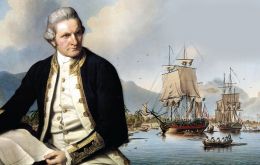MercoPress. South Atlantic News Agency
Tag: history
-
Thursday, October 28th 2021 - 09:23 UTC
Falkland Islands: Team discovers evidence of prehistoric human activity

The following piece was published by Phys/Org – Since its first recorded sighting by European explorers in the 1600s, scientists and historians have believed that Europeans were the first people to ever set foot on the Falkland Islands. Findings from a new University of Maine-led study, however, suggests otherwise; that human activity on the islands predates European arrival by centuries.
-
Tuesday, October 27th 2020 - 08:25 UTC
Falklands and privateer/pirate captain David Jewett 1820 adventure

In response to Argentina’s planned commemorations of the 200th anniversary of the visit to the Falklands by the privateer captain David Jewett in 1820 and his purported “taking of possession” of the Islands for Argentina, historian Graham Pascoe has released the paper ‘David Jewett’s visit to the Falklands, 1820-21: no valid “possession-taking.” Dr. Pascoe notes in his abstract that before David Jewett arrived he had captured a neutral Portuguese ship, and he captured another neutral US ship in the Islands.
-
Tuesday, August 21st 2018 - 08:59 UTC
Prague 1968: “Socialism with a human face” squashed by 200.000 Soviet and Warsaw Pact troops

More than 200,000 Soviet and Warsaw Pact troops invaded Czechoslovakia overnight from August 20 to 21, 1968, to halt a blossoming political and cultural liberalization, bringing an abrupt end to the Prague Spring and tightening the Kremlin's grip.
-
Friday, February 2nd 2018 - 19:49 UTC
South Georgia celebrated on 17 January “Possession Day”

On 17th January 1775 a small party of men landed on a beach beneath snowy peaks and tumbling glaciers. In charge was an officer by the name of James Cook; the British Flag was planted, a volley of musket shot was fired, and the land was claimed for His Britannic Majesty. Cook named the bay in which he landed Possession Bay. On the 17th January 2018 (and every year) South Georgia marked ‘Possession Day’ with a bank holiday and reception at Government House.
-
Thursday, April 28th 2011 - 18:09 UTC
How do Falklands and Argentina youngsters learn about history of their countries

A British university research project is being conducted which will examine how youth from the Falkland Islands (or the Islas Malvinas as defined in Argentina) and Argentina learn about the history of their territories and nation-state. The study will also reflect on the perspectives of youth in the region regarding the ongoing tensions between the UK and Argentina.
